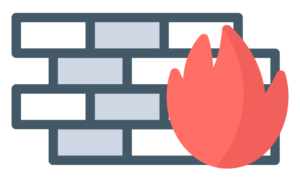Certified Ethical Hacking Course - CEH Certif ...
- 31k Enrolled Learners
- Weekend/Weekday
- Live Class
In recent times, dependence on online transactions for daily needs has grown many folds. However the internet is prone to multiple threats. Any organization or any individual who expose their systems on the internet, have to endeavor to safeguard their resources and information by implementing appropriate techniques to circumvent these threats. One such technique is Firewall, which is one of the fundamental concepts covered in cyber security. In this article let’s learn more about Cybersecurity firewall.
Cyber Security Full Course In 8 Hours
This Edureka video on “Cyber Security Full Course” will help you understand and learn the fundamentals of Cyber Security.
Introduction to Cyber Security
Cyberworld or cyberspace is a market place of all devices and entities that are interconnected using the internet also known the World Wide Web. Communication between different entities in cyberspace, namely, large enterprise systems, financial applications, software as service on the cloud, institutions, small and medium enterprises, self-employed individuals laptops, desktops, mobile applications, are all prone to threats. A threat to an entity in the cyberspace can be:

Ready to take your career in cybersecurity to the next level? CISSP Certification is the way!
Also Read: CISSP Certification Requirements – Complete Guide
A cybersecurity firewall is a network security system which can either be a hardware or software that protects the trusted network from unauthorized access from external networks and external threats.

Enroll in a prestigious Cyber Security Internship program to kickstart your career.
Implementing a firewall does the following things:
Organizations have to implement other mechanisms and controls to circumvent these threats. Threats like, intrusion detection systems and intrusion prevention systems. Attacks from the internet of virus, trojans, spyware, ransomware, denial of service, malware, can be foiled by implementing an antivirus and other prevention and detection systems alongside firewalls.
Check out our new CEH (v13) – Certified Ethical Hacker course to learn the in-depth concepts of ethical hacking and get skilled.
Note: Internal threats are threats from users inside the trusted network who have malicious intentions and have all the access to commit.
Read Related Post Hiding information from netstat
There are multiple solutions to detect and prevent malicious behavior and attacks. Because there are many ways to avoid attacks a need is felt to find integrated solutions for firewalls, antivirus, anti-spam, and intrusion detection and intrusion prevention. Such solutions will be the next-generation innovation in the field of Cyber Security.
Every commercial or application services exposed on the internet will have its own security requirements based on the functionality. A detailed study and feasibility analysis must be done before implementing the most appropriate of security control systems. To beat the world of threats and hackers, the focus has to be on implementation and then continual improvisations to meet all the possible current and future threats. A firewall is one of the many solutions available in today’s world cybersecurity to control these external threats.
That’s it, folks! This brings us to the end of this “Cybersecurity Firewall” article. If you wish to learn cybersecurity and build a colorful career in cybersecurity, then check out our Cyber Security Certification Training which comes with instructor-led live training and real-life project experience. This training will help you understand cybersecurity in-depth and help you become Masters in Cyber Security.
You can also take a look at our newly launched course on CompTIA Security+ Certification Course which is a first-of-a-kind official partnership between Edureka & CompTIA Security+. It offers you a chance to earn a global certification that focuses on core cybersecurity skills which are indispensable for security and network administrators.
Learn Cybersecurity the right way with Edureka’s POST-GRADUATE PROGRAM with NIT Rourkela and defend the world’s biggest companies from phishers, hackers and cyber attacks.
 Thank you for registering Join Edureka Meetup community for 100+ Free Webinars each month JOIN MEETUP GROUP
Thank you for registering Join Edureka Meetup community for 100+ Free Webinars each month JOIN MEETUP GROUPedureka.co